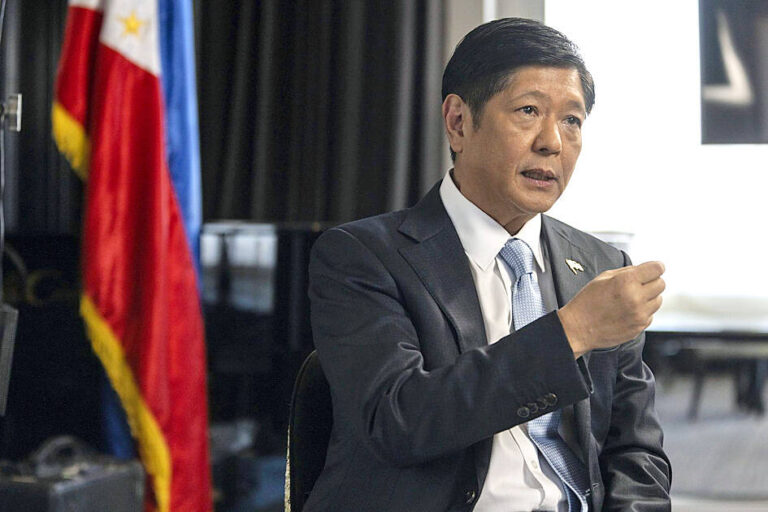Philippine President Ferdinand Marcos Jr has said his country’s military must urgently focus on the protection of territorial integrity as disputes between Manila and China multiply amid growing rivalry in the region between Beijing and Washington.
Marcos Jr made his comment in a speech to his armed forces just weeks after he summoned China’s ambassador in Manila to protest against the use of a military-grade laser by the Chinese coastguard that briefly blinded crew members of a Philippine patrol vessel in the South China Sea.
“I’m saying that your mission in the AFP has changed,” Marcos told troops late on Monday, referring to the Armed Forces of the Philippines.
“For many, many years, we were able to maintain that peace and maintain that understanding with all of our neighbours. Now things have begun to change and we must adjust accordingly,” he said.
The president said his country’s boundaries were being put into question, “and there are many things that are happening so the air force has a very big mission to fully secure the Philippines”.
He also cited “the intensification of the competition between the superpowers”.
While not offering specifics nor mentioning China by name in his speech in central Cebu province, he underscored that Philippine foreign policy remains committed to peace.
Despite being a relatively small country, “we still have to fight for the rights of every Filipino because the Philippines is a sovereign nation”, he said.
The president’s remarks come at a time when the Philippine military has begun to refocus external defence after decades of internal conflicts involving Muslim and communist rebel groups.
China, the Philippines, Vietnam, Malaysia, Taiwan and Brunei have been locked in an increasingly tense territorial standoff in the South China Sea, where US Navy ships and fighter jets have carried out patrols to promote freedom of movement, challenge Beijing’s expansive claims and reassure allies like the Philippines.
The disputes have intensified since China turned several disputed reefs into missile-protected island bases to bolster its claims to almost the entirety of the South China Sea. The maritime dispute is regarded as a possible Asian flashpoint and a delicate front in the US-China rivalry in the region.
Under a 2014 defence pact, Marcos recently approved a wider US military presence in the Philippines by allowing rotating batches of US forces to stay in four more Philippine military camps. That is a sharp turnaround from his predecessor Rodrigo Duterte, who feared that a US military presence could offend Beijing.

Manila has also entered agreements for close military relations with Japan and Australia’s Defence Minister Richard Marles said last week that the two countries were considering jointly patrolling the South China Sea.
The Philippine Department of Foreign Affairs said on Monday that it had filed dozens of protests to China over what it describes as Beijing’s “illegal presence” in the West Philippine Sea – the official name that Manila uses to refer to areas of the South China Sea. Foreign affairs spokesperson Teresita Daza said the Philippines has filed a total of 77 protests against China, including 10 lodged so far this year.
“The Philippines continues to protest China’s persistent and illegal presence in the Philippine waters, including those near Ayungin Shoal,” Daza said, according to the state-run Philippine News Agency.
Earlier this month, Manila accused China’s coastguard of aiming a “military-grade laser” at one of its coastguard vessels that was supporting a resupply mission for troops on an atoll in Ayungin Shoal, which is also known as Second Thomas Shoal.
Philippine Ambassador to the US Jose Manuel Romualdez told Reuters news agency on Monday that the Philippines is in talks to possibly include Australia and Japan in planned joint South China Sea patrols with the US.
If the plan materialises, it will be the first time the Philippines will join multilateral maritime patrols in the South China Sea, a move that would likely anger Beijing, which claims most of the sea as its territory.
The foreign ministries of Australia and Japan and the embassies of the US and China in Manila did not immediately respond to separate requests for comment.
Source : Al Jazeera


